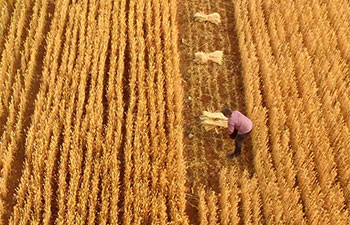CANBERRA, May 28 (Xinhua) -- The world's fishing fleet has more than doubled in size since 1950 but the catch has fallen 80 percent, an Australian study has found.
The analysis of global fishing data released by the Commonwealth Scientific and Industrial Research Organisation (CSIRO) and Institute for Marine and Antarctic Studies (IMAS) on Tuesday revealed that the fishing fleet grew from 1.7 million vessels in 1950 to 3.7 million in 2015.
However, lead author Yannick Rousseau from IMAS said that despite improved technology, modern fishing vessels were taking one-fifth of the catch per unit of effort (CPUE) that those in the 1950s achieved.
"What we have seen over the last 65 years is more and more fishing vessels chasing fewer fish," he said in a media release.
"Since 1950 a dramatic increase in the size of the fishing fleet in Asia has more than offsetting small declines in North America and Western Europe.
"Most of the increase in vessel numbers has been in motorized fishing boats, a change from the unpowered 'artisanal' fishing vessels that once characterized Asian and African fishing fleets.
"But, despite its advanced technology and increased numbers, the modern motorized fleet is having to work much harder to catch fewer fish."
CPUE is a metric used to assess the state of fish stocks and fisheries management.
Rousseau said that the sharpest declines in CPUE were in southeast Asia, Latin America and the southern Mediterranean, an indication that fishing fleets in those regions expanded at a rate fish stocks couldn't support.
The size of Australia's fleet has fallen in the last decade, leading to the CPUE stabilizing.
"However, on current worldwide trends we can expect to see a further one-million vessels on the water by mid-century and the average engine power of the global fleet continues to increase," Rousseau said.
"These changes will further challenge the sustainable use of fisheries resources in the coming years.
"Our findings suggest that additional management measures are urgently warranted to ensure the future sustainability of global marine resources."













